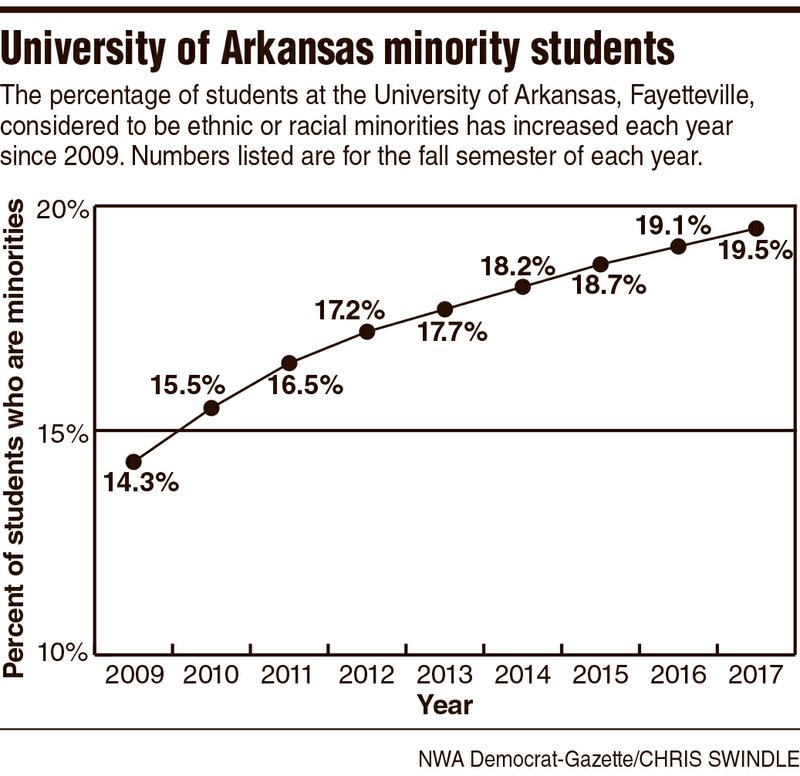FAYETTEVILLE -- Dozens of Northwest Arkansas high school sophomores are participating in a University of Arkansas, Fayetteville program designed to help them achieve their dreams of going to college.
The College Access Initiative Pipeline program started this year. It is intended to serve teens who are in minority groups, are from low-income families or who would be the first in their family to attend college.
About 110 sophomores from the Bentonville, Fayetteville, Gravette, Rogers and Siloam Springs school districts are participating, said Sarah Draine, director of the College Access Initiative, part of the university's Center for Multicultural and Diversity Education.
Students in the program meet with the coordinator several times per semester for guidance on topics such as financial aid, taking the ACT and social skills. They will continue to meet with the coordinator periodically until they graduate.
Draine said that although the university is always interested in increasing its diversity, the program is not focused on recruiting new UA students.
"Our first goal is to get you ready and prepared to go to college," she said.
The Walton Family Foundation provided the university a grant that pays 40 percent of the program's costs over three years, Draine said. The university pays the rest of the cost. It is free to students.
Thirteen Fayetteville High School sophomores gathered earlier this month for their first meeting under the program in the school's college and career center, where the walls are adorned with dozens of pennants and posters representing colleges and universities across the country.
The program coordinator asked the students to devise a list of goals related to their academic futures and list specific steps to achieving those goals.
Then she had them take the ACT Tessera, an assessment system ACT launched last year that measures social and emotional learning skills in areas such as tenacity and grit, composure, organization and teamwork.
A growing number of research studies have shown that social and emotional learning skills -- sometimes known as behavioral or noncognitive skills -- are essential for success in school and a career, according to an ACT news release from August.
Dakota Jennings, a Fayetteville High School sophomore, joined the Pipeline program after receiving an invitation from the school to come to a meeting about it.
"I want to go to college, but I don't have anybody in my family who went," said Jennings, 16.
He said he's thinking about staying close to home for college but wants to learn more about his options.
A Bentonville High School group of 22 sophomores met with the program coordinator for the second time on April 5. Among them was Lilly Alas, 16, of Bella Vista.
She said she was drawn to the program in part to get help finding college scholarships.
"I thought that would be really great, so I wouldn't be in more debt when I am an adult," Alas said. "Since I've been in the program, I've realized that college is really close, and I really need to do more thinking about it."
Among the colleges high on her list are the University of Arkansas and the University of Central Arkansas. She stands to be the first in her immediate family to go to college.
In a recent one-on-one meeting, Alas and the program coordinator discussed Alas' grade-point average and her grades from her last report card. They talked about how Alas could raise her lowest grade.
"It was good to hear from someone else other than your family what you could do to improve. And my family is super supportive, but it was cool to have someone else back you up," Alas said.
Elliott Nimrod, also a Bentonville High School student, said he'd given college some thought before signing up for the program.
"But I wasn't getting into the specifics of where I wanted to go, how much it will cost, and what should my GPA be. This really opened my eyes to how I have to have all of these different things to get into college and all the different requirements," he said.
Nimrod, 16, plays football and soccer. He aims to be a kicker for a college football team. The pipeline program has reinforced for him how important it is to focus on academics "and not just come here and mess around," he said.
Program officials are hosting a picnic at the university Saturday for all participants, where they'll have a chance to network with one another and spend time on a college campus.
There are 269 sophomores in the Bentonville district whose family income qualifies them for free or reduced-price meals at school, a standard measure of poverty in schools, according to Jennifer Morrow, director of secondary education. That's about 21 percent of all sophomores in the district.
Nationally, about 65 percent of low-income, recent high school graduates were enrolled in college as of 2016, up from 31 percent in 1975. The latest percentage is roughly equal to the percentage of middle-income students but still lags behind high-income students by about 17 percentage points, according to the National Center for Education Statistics.
Tenth grade is just the right time to engage students with a program like Pipeline, Morrow said.
"Twelfth grade is too late. Eleventh grade could be too late. In 10th grade, they're a little more focused than they are in ninth grade," she said.
Metro on 04/22/2018

